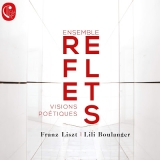 Visions Poétiques; Franz Liszt: 3 Sonetti del Petrarca, S. 270a + Romance oubliée, S. 527 + Bénédiction de Dieu dans la Solitude aus Harmonies poétiques et religieuses, S. 173; Lili Boulanger: D'un vieux jardin + D'un jardin clair + Pièce en fa # + Nocturne + D'un matin de printemps + D'un soir triste; Magali Léger, Sopran, Ensemble Reflets (Marie-Laure Boulanger, piano, François Douchet, Viola, Thierry Durand, Flöte), Clara Strauss, Cello; 1 CD Calliope CAL 2078; Aufnahmen 2010, 2013, 2019, Veröffentlichung 05/2020 (66'36) - Rezension von Norbert Tischer
Visions Poétiques; Franz Liszt: 3 Sonetti del Petrarca, S. 270a + Romance oubliée, S. 527 + Bénédiction de Dieu dans la Solitude aus Harmonies poétiques et religieuses, S. 173; Lili Boulanger: D'un vieux jardin + D'un jardin clair + Pièce en fa # + Nocturne + D'un matin de printemps + D'un soir triste; Magali Léger, Sopran, Ensemble Reflets (Marie-Laure Boulanger, piano, François Douchet, Viola, Thierry Durand, Flöte), Clara Strauss, Cello; 1 CD Calliope CAL 2078; Aufnahmen 2010, 2013, 2019, Veröffentlichung 05/2020 (66'36) - Rezension von Norbert Tischer
Das Ensemble Reflets hat sein neues Album mit Kompositionen von Franz Liszt und Lili Boulanger mit Visions Poétiques betitelt. Die Trois Sonnets de Pétrarque hat Liszt selber für Klavier bez. für Klavier und Gesang herausgegeben. Die französisch-kanadische Pianistin Marie-Laure Boulanger hat nun eine Bearbeitung für Sopran, Klavier, Flöte und Viola besorgt. Sie bringt neue Farben in die Musik und damit ganz klar Mehrwert.
Mit ihrer leichten, flexiblen Sopranstimme erweist sich Magali Léger als eine gute Interpretin für diese Musik. Sie kann die dramatischen Momente ohne Pathos genauso passend gestalten wie die intimeren, lyrischen und zarten Passagen. Besonders schön finde ich, wie die Bratsche die Stimme umschmeichelt. Schade nur, dass man vom Gesang kein Wort versteht.
Sehr empfindsam wird die Romance oubliée von der Bratschistin Françoise Douchet und der Pianistin Marie-Laure Boulanger gespielt, die sich auch durch eine einfühlsame und brillant gespielte Fassung der Bénédiction de Dieu dans la Solitude auszeichnet.
Der zweite Teil der CD mit Werken von Lili Boulanger (1893-1918) beginnt mit den zwei reizenden Klavierstücken D’un vieux Jardin und D’un Jardin Clair, die Boulanger fein nuanciert spielt. Die beiden Werke für Klavier und Flöte, Pièce en fa # und vor allem Nocturne sind hingegen nicht besonders inspiriert, und dem Spiel des Flötisten fehlt es an Geschmeidigkeit und Wärme.
In den beiden Trios, die Thierry Durand zusammen mit Marie-Laure Boulanger und der Cellistin Clara Strauss spielt, kommt es zu einem insgesamt ausdrucksvollen und technisch kohärenten Musizieren.
Trotz der Einschränkungen kann man diese CD wegen ihres originellen Programms und der weitgehend guten Interpretationen empfehlen.
Visions Poétiques is the title chosen by Ensemble Reflets for its new album with compositions by Franz Liszt and Lili Boulanger. The Trois Sonnets de Pétrarque were published by Liszt for piano or for piano and voice. The French-Canadian pianist Marie-Laure Boulanger has written an arrangement for soprano, piano, flute and viola. It definitely brings new colours to the music and thus clearly adds value.
With her light, flexible soprano voice Magali Léger proves to be a good interpreter of this music. She is able to shape the dramatic moments without pathos just as appropriately as the more intimate, lyrical and tender passages. I especially like the way the viola caresses the voice. It’s just a pity that you can’t understand a word of the singing.
The Romance oubliée is played very sensitively by the violist Françoise Douchet and the pianist Marie-Laure Boulanger, who delivers a sensitive and brilliantly played version of the Bénédiction de Dieu dans la Solitude.
The second part of the CD with works by Lili Boulanger (1893-1918) begins with the two charming piano pieces D’un vieux Jardin and D’un Jardin Clair, which Boulanger plays with fine nuances. The two works for piano and flute, Pièce en fa # and above all Nocturne, on the other hand, are not particularly inspired, and the flutist’s playing lacks suppleness and warmth.
In the two trios, which flutist Thierry Durand plays together with Marie-Laure Boulanger and the cellist Clara Strauss, the performances are overall expressive and technically coherent.
Despite our reservations for the two Boulanger works, this CD can be recommended for its original programme and the mostly good interpretations.
























